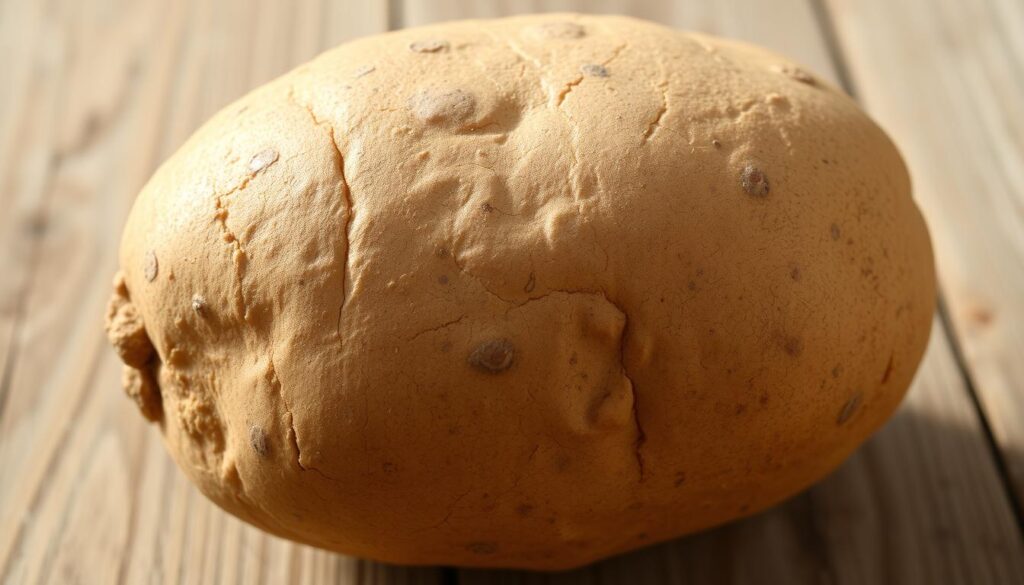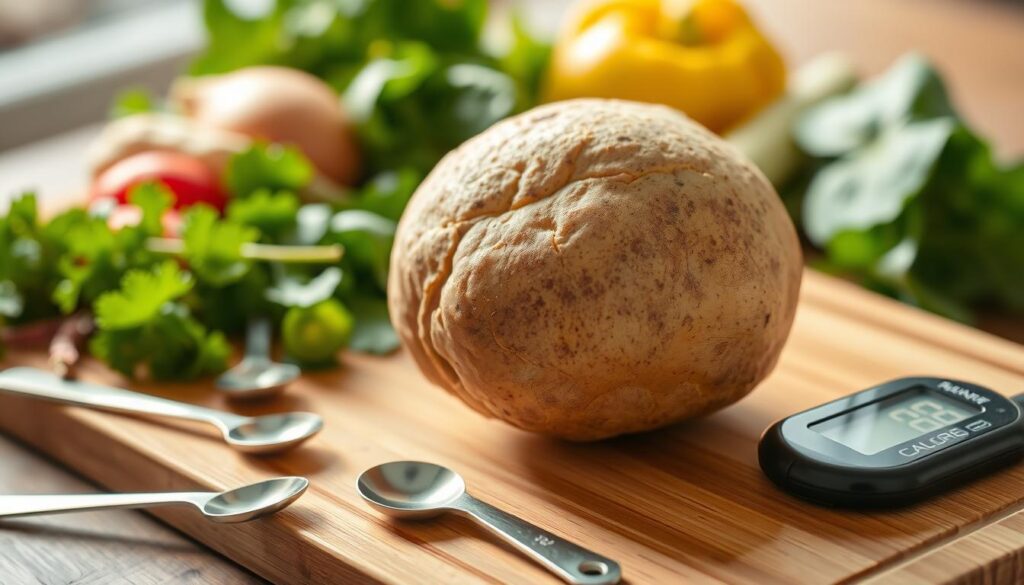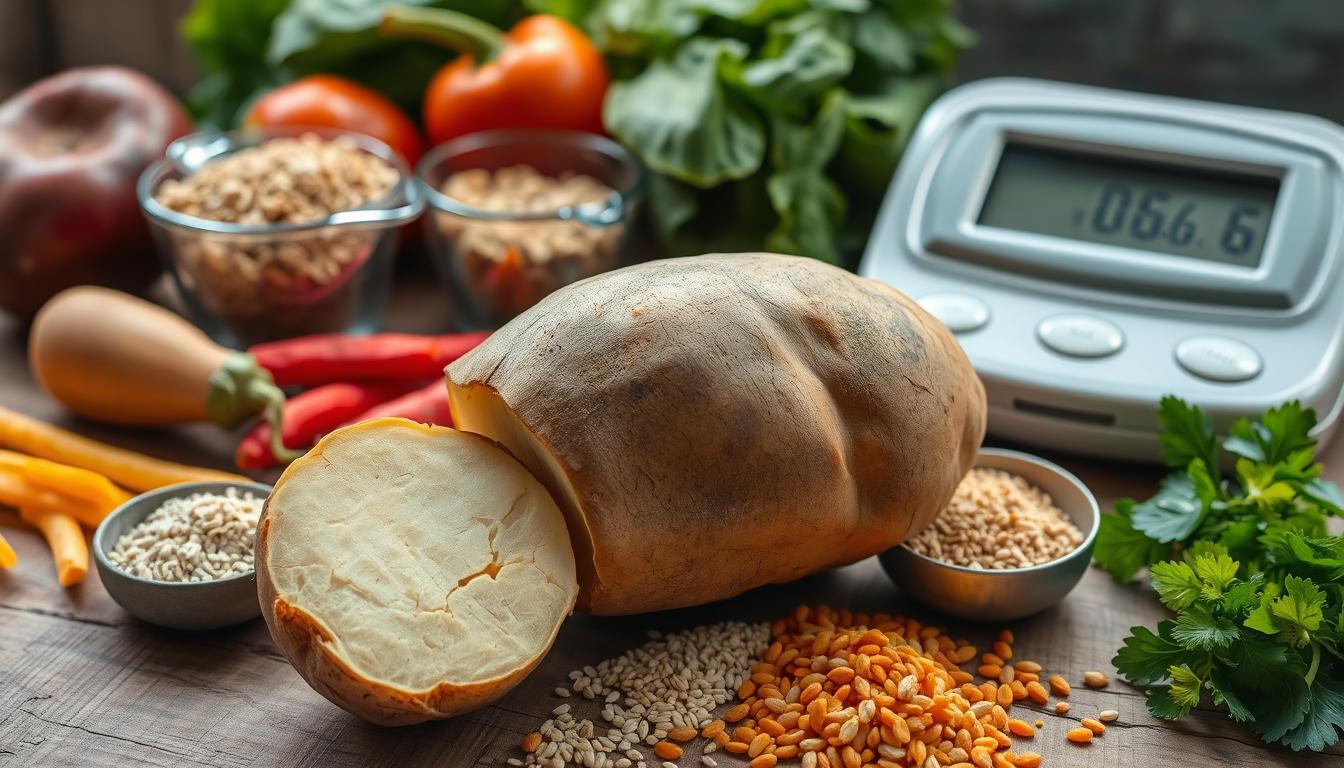Russet potatoes, also known as Burbank potatoes, are a favorite in many homes in the United States. They are loved for their light, fluffy texture and tasty flavor. But, people who care about their health often wonder about the calories in russet potatoes. This article will explore the nutritional facts of russet potatoes and answer the calories in a russet potato. It aims to give readers a clear picture of their calorie count and nutritional value.
Key Takeaways
- Russet potatoes are a popular and versatile potato variety known for their light, fluffy texture and delicious flavor.
- The calorie content of russet potatoes can vary depending on various factors, such as size, cooking method, and preparation.
- Russet potatoes are a good source of carbohydrates, fiber, and various essential vitamins and minerals.
- Incorporating russet potatoes into a balanced diet can provide numerous health benefits, including supporting digestive health and maintaining blood sugar levels.
- Understanding the calorie content and nutritional value of russet potatoes can help individuals make informed choices for their health and wellness goals.
What is a Russet Potato?
Russet potatoes, also known as Burbank potatoes, have a rough, brown skin. They are starchy and oblong in shape. These potatoes were first grown in the United States and are now found worldwide.
There are many varieties of russet potatoes. Each has its own special features and uses in cooking.
Origin and Varieties
The Russet Burbank potato was created by Luther Burbank in the late 1800s. It’s the most famous and widely grown type. Other varieties, like the Ranger Russet and Classic Russet, are also popular.
The Ranger Russet is a bit longer. The Classic Russet is known for its consistent size and look.
Physical Characteristics
Russet potatoes are big and oblong, with thick, brown skin. Inside, they are white or pale yellow and fluffy. When cooked, they are light and airy.
This makes them great for baking, mashing, and more. Their texture is often described as “mealy” or “floury.”

Russet potatoes are loved for their versatility. They can be roasted, fried, baked, or boiled. They’re perfect for french fries, baked potatoes, and mashed potatoes.
Calorie Content of a Russet Potato
Russet potatoes are known for their starchy and fluffy texture. They are a low-calorie food choice. A medium-sized (173g) baked russet potato has about 168 calories. The calorie count can change based on how you cook it and how much you eat.
Russet potatoes are a good source of complex carbs. They give you energy all day long. They also have dietary fiber, which helps you feel full and aids digestion.
| Nutrient | Amount per 173g Baked Russet Potato |
|---|---|
| Calories | 168 |
| Carbohydrates | 37g |
| Fiber | 4g |
| Protein | 4g |
| Fat | 0g |
The calorie content in russet potatoes can change based on cooking and portion size. Frying or adding high-calorie toppings like butter, sour cream, or cheese increases calories. Baking or boiling without extra fats or sauces keeps calories lower.

How Many Calories in a Russet Potato?
The number of calories in a russet potato can change a lot. A small (148g) russet potato has about 100 calories. But, a large (298g) russet potato can have over 300 calories. Several things can affect these calorie counts.
Factors Affecting Calorie Count
There are a few main things that can change how many calories a russet potato has:
- Size – Bigger potatoes have more calories than smaller ones.
- Cooking Method – Baked or boiled potatoes have fewer calories than fried or roasted ones.
- Added Toppings and Ingredients – Things like butter, sour cream, cheese, and bacon can add a lot of calories.
For instance, a plain, medium-sized (173g) baked russet potato has about 161 calories. But, if you add 2 tablespoons of butter, the calories go up to 361 calories.
“The calorie content of a russet potato can range from around 100 calories for a small potato to over 300 calories for a large one, depending on size, cooking method, and added ingredients.”
Knowing what affects the calories in a russet potato is important. It helps you choose the right size and cooking method. This way, you can keep your calorie intake in check.
Nutritional Value of Russet Potatoes
Russet potatoes are packed with nutrients. They are a good source of complex carbohydrates, fiber, and vitamins and minerals. One medium potato has about 37 grams of carbs and 4 grams of fiber. This makes them a filling and satisfying part of a balanced diet.
Carbohydrates and Fiber
The carbs in russet potatoes are complex. They are digested slowly, giving you steady energy. The fiber in them also helps with digestion and keeps blood sugar levels stable.
| Nutrient | Amount in 1 Medium Russet Potato |
|---|---|
| Carbohydrates | 37 grams |
| Fiber | 4 grams |
The nutritional value of russet potatoes makes them great for a healthy diet. Their carbohydrate and fiber content gives you lasting energy and supports your digestive health.
“Russet potatoes are a nutrient-dense food that can be a valuable part of a healthy diet.”
Health Benefits of Russet Potatoes
Russet potatoes are great for a healthy diet. They add flavor to meals and are packed with vitamins, minerals, and antioxidants. These nutrients help keep you feeling good.
They’re good for your digestive system too. Russet potatoes are full of fiber, which helps your bowels work right. They also have resistant starch, which aids digestion.
They help control blood sugar levels. Even though they’re carbs, they don’t raise blood sugar fast. This is good for people with diabetes or anyone who wants stable blood sugar.
Russet potatoes are also heart-friendly. They’re rich in potassium, which keeps blood pressure in check. Plus, they have antioxidants like vitamin C and carotenoids. These fight off heart disease by reducing inflammation and oxidative stress.
In summary, russet potatoes are a smart choice for a healthy diet. They boost digestion, control blood sugar, and support heart health. These benefits make them a key part of a balanced diet.
Cooking Methods and Calorie Impact
Choosing how to cook russet potatoes affects their calorie count. Knowing the calorie impact of different methods helps you make healthier choices. This way, you can enjoy russet potatoes without too many calories.
Boiling and Baking
Boiling or baking russet potatoes is a low-calorie option. These methods use little to no added fats. This keeps the potato’s natural, low-calorie state intact. Boiling and baking are great for those watching their calories, as they keep the potato’s nutrients without extra calories.
Frying and Roasting
Frying or roasting russet potatoes, however, adds more calories. Using oils or fats during these methods increases the calorie count. Fried or roasted potatoes have more calories than boiled or baked ones. So, it’s key to watch your portion sizes when enjoying these dishes.
| Cooking Method | Calorie Impact |
|---|---|
| Boiling | Low calorie |
| Baking | Low calorie |
| Frying | High calorie |
| Roasting | High calorie |
Knowing the calorie impact of cooking methods helps you choose the best way to prepare russet potatoes. This way, you can include them in a balanced, healthy diet.
Russet Potato Portion Control
Managing calories in russet potatoes starts with portion control. A standard serving is one medium (173g) potato, which has about 168 calories. But, it’s easy to eat more than we think, leading to more calories.
To stay healthy, watch your russet potato portion size. Big portions or extra toppings can add a lot of calories. By controlling calories in russet potatoes, you can still enjoy their health benefits.
- A medium (173g) russet potato contains approximately 168 calories.
- Larger portions or high-calorie toppings can quickly increase the calorie count.
- Pay attention to how much is a serving of russet potatoes to maintain a healthy balance.
| Russet Potato Size | Calories |
|---|---|
| Small (148g) | 144 calories |
| Medium (173g) | 168 calories |
| Large (298g) | 290 calories |
Knowing the russet potato portion size helps you enjoy their taste and health benefits. This way, you can keep your calorie intake in check.
Low-Calorie Russet Potato Recipes
Adding russet potatoes to a diet low in calories is easy. Use baking or roasting with herbs and spices. Also, try russet potato salads with fresh veggies. These methods let you enjoy russet potatoes without too many calories.
Mashed russet potatoes with low-fat dairy like skim milk or Greek yogurt are tasty and light. They’re full of complex carbs and fiber. Plus, they’re not too high in calories.
Roasted russet potato wedges with olive oil, garlic, and rosemary are both tasty and healthy. Serve them with a salad or grilled meat for a full, low-calorie russet potato meal.
“Russet potatoes are a versatile and nutrient-dense ingredient that can be incorporated into a variety of low-calorie recipes. By focusing on healthy cooking methods and flavorful seasonings, you can enjoy the comforting taste of russet potatoes while keeping your calorie intake in check.”
Looking to reduce calorie intake or add healthy russet potato dishes to your diet? There are many low-calorie recipes using russet potatoes to try. With a bit of creativity and healthy ingredients, you can enjoy russet potatoes without harming your health goals.
Comparing Russet Potatoes to Other Potato Varieties
Russet potatoes are popular, but other types have different nutrients and calories. Knowing about these differences helps people choose what’s best for them.
Calorie Comparison
A medium russet potato has about 130 calories. A medium red potato has 110 calories, and a medium sweet potato has 100 calories. These numbers matter for those watching their calorie intake.
Nutritional Differences
- Russet potatoes have lots of carbs and fiber.
- Red potatoes have less carbs but more vitamin C and potassium than russet potatoes.
- Sweet potatoes are packed with vitamin A and have more fiber than russet and red potatoes.
| Nutrient | Russet Potato | Red Potato | Sweet Potato |
|---|---|---|---|
| Calories | 130 | 110 | 100 |
| Carbohydrates | 29g | 26g | 23g |
| Fiber | 3g | 2g | 4g |
| Vitamin A | 0 IU | 0 IU | 21,909 IU |
| Vitamin C | 12mg | 17mg | 26mg |
| Potassium | 610mg | 620mg | 438mg |
Knowing the nutritional differences between russet, red, and sweet potatoes helps people choose the right potatoes for their diet. This way, they can meet their dietary needs and enjoy a variety of potatoes.
Russet Potato Storage and Shelf Life
Keeping russet potatoes fresh is easy with the right storage and handling. To keep them in top shape, follow a few simple steps.
Russet potatoes need a cool, dark spot to stay fresh. A pantry or cellar is perfect. Avoid sunlight and warm spots to prevent sprouting and softening. With the right spot, they can last weeks to months.
The shelf life of russet potatoes depends on a few things. Properly stored, they can last up to 3-4 months. But it also depends on the variety, growing conditions, and how they’re handled. Here are some tips to keep them fresh:
- Keep them in a cool, dark place, between 45°F and 55°F (7°C and 13°C).
- Don’t store them in the fridge. It can make them taste sweet and look off.
- Check them often and toss any that sprout, get soft, or look bad.
- Use a paper or mesh bag for storage. It lets air in and keeps moisture out.
By following these tips for keeping russet potatoes fresh, you can enjoy their taste and health benefits for a long time.
| Storage Conditions | Russet Potato Shelf Life |
|---|---|
| Cool, dark, and well-ventilated (45°F to 55°F) | 3-4 months |
| Refrigerator (below 40°F) | 1-2 weeks |
| Warm, humid environment | 1-2 weeks |
Remember, the right storage of russet potatoes is crucial. It keeps them fresh and full of nutrients. By following these tips, you can maximize the shelf life of your russet potatoes and enjoy them in your meals.
Conclusion
Russet potatoes are packed with nutrients like carbs, fiber, and vitamins. Knowing how many calories they have helps us choose them wisely for our meals. They can be boiled, baked, or roasted, making them a great addition to any meal.
These potatoes are rich in carbs and fiber, offering health benefits. Adding them to our diet can boost our health and energy. They’re a key part of eating well.
In short, russet potatoes are good for those aiming for a balanced diet. Their calorie content and nutritional value are impressive. By learning how to prepare them, we can enjoy their health benefits.
